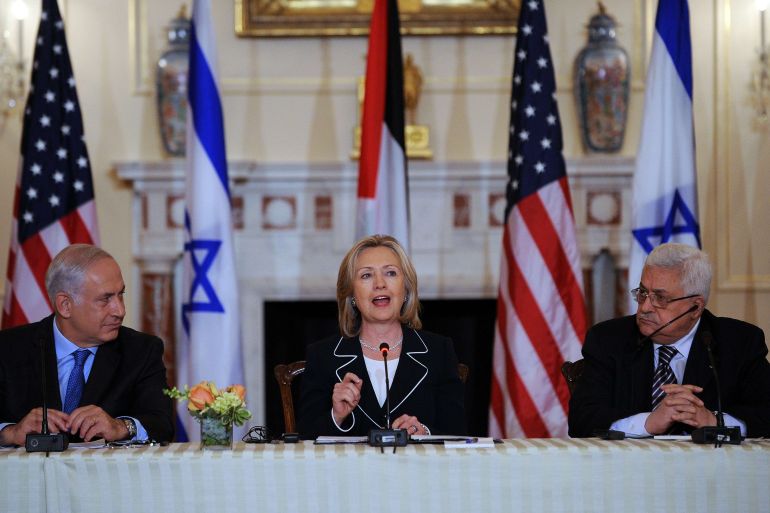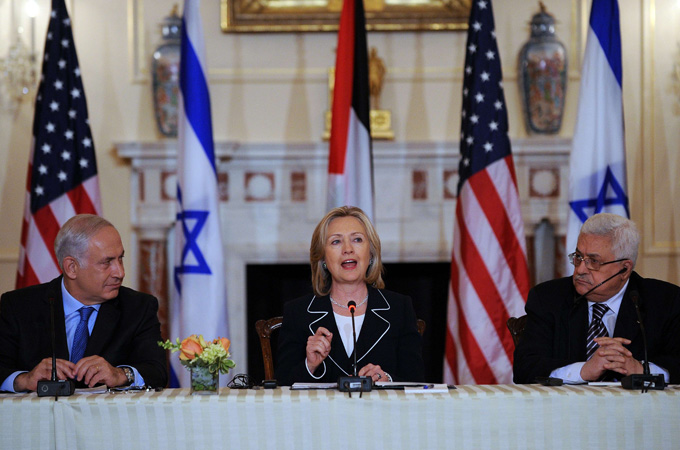Middle East peace talks open in US
Hillary Clinton, US secretary of state, lauds Israeli and Palestinian leaders for taking ‘an important step’ for peace.

 |
| Clinton praised the two leaders for the “courage” it took for the them to sit down together on Thursday [AFP] |
Hillary Clinton, the US secretary of state, has formally opened a summit in Washington for direct talks between Palestinian and Israeli leaders, saying the US “cannot and will not impose a solution”.
“I know the decision to sit at this table was not easy,” Clinton told Mahmoud Abbas, the Palestinian president, and Benyamin Netanyahu, the Israeli prime miniter, who were seated on either side of her at the State Department on Thursday.
“By being here today, you each have taken an important step toward freeing your peoples from the shackles of a history we cannot change and moving toward a future of peace and dignity that only you can create.”
Thursday’s talks were the first direct negotiations the two sides have held in nearly two years.
Netanyahu followed Clinton’s remarks, saying the talks would “not be easy”.
“A true peace, a lasting peace, [would] be achieved only with mutual and painful concessions from both sides,” he said.
Abbas, meanwhile, emphasised Palestinian demands that Israel stop the construction of illegal settlements and end it’s economic siege of the Gaza Strip.
Barack Obama, the US president, made an appeal to the Israeli and Palestinian leaders on the eve of the Washington summit to not let the chance for peace slip away, and pledged to put the “full weight” of the United States behind the effort to forge peace.
“As I told each of them today, this moment of opportunity may not soon come again. They cannot afford to let it slip away,” Obama said after one-on-one talks with Netanyahu and Abbas on Wednesday.
“I am hopeful, cautiously hopeful, but hopeful,” the US president said later with the leaders of Jordan, Egypt, Israel and the Palestinians beside him in the crowded East Room of the White House.
Peace vs interests
Abbas and Netanyahu shook hands and pledged to work diligently toward peace, but they also made plain that their own national interests must be satisfied.
Abbas urged Israel to freeze settlement construction in areas the Palestinians want as part of their new state, and to end its blockade of Gaza, which is controlled by the Hamas movement.
“We will spare no effort and we will work diligently and tirelessly to ensure these negotiations achieve their cause,” Abbas said.
Netanyahu, in return, called Abbas “my partner in peace” and pledged to seek an end to the conflict “once and for all”.
But he also stressed the central importance of security assurances for Israel as part of any land-for-peace agreement with the Palestinians.
| in depth | |||||||||||||||||||||||
|
“We left Lebanon, we got terror. We left Gaza, we got terror. We want to ensure that territory we concede will not be turned into a third Iranian-sponsored terror enclave aimed at the heart of Israel,” Netanyahu said.
Abbas’ call for settlement freeze was also echoed by Hosni Mubarak, the Egyptian president.
Mubarak urged Netanyahu to make good on his vow to forge peace with the Palestinians and reiterated a plea for Israel to halt settlement activity.
“I urge Israel to reach out to the Arab hand extended for peace,” Mubarak said.
“Israel should totally halt settlement activity until the peace process comes to a conclusion.”
In return, King Abdullah II of Jordan warned of a failure and stressed the necessity of the US commitment to make such talks a success.
“President Obama, we need your support as a mediator, honest broker and a partner. If hopes are disappointed again, the price of failure will be too high for all,” King Abdullah said.
Yousef Munayyer, the executive director of the Palestinian Center in Washington, told Al Jazeera the “risk is extremely great for Abbas” and “the road forward does not seem very promising”.
“Here we have a Palestinian president who has a number of question marks surrounding the legitimacy of his leadership, who spent the entire summer telling his poplulation that he would refuse to enter direct negotiations without a settlement freeze – yet he now enters talks without preconditions.”
American officials are hopeful they can get the two sides this week at least to agree to a second round of talks, likely to be held in the second week of September.
That could be followed by another meeting among Obama, Netanyahu and Abbas on the sidelines of the UN General Assembly near the end of the month in New York.
Hurdles ahead
Al Jazeera’s Nour Odeh, reporting from Nablus, said that given the current situation, there is little optimism that peace talks will change anything in the West Bank.
“As declarations of commitment to peace and commitment to finding a solution to the decades-long conflict in the Middle East were exchanged in Washington, the reality on the ground in the occupied West Bank seemed quite detached from those niceties,” our correspondent said.
“Two attacks against Israeli settlers in less than 48 hours have left the situation quite tense here.”
|
“There are going to be extremists and rejectionists who, rather than seeking peace, are going to be seeking destruction” Barack Obama, |
Beyond the settlements, Israel and the Palestinians face numerous hurdles in resolving other contentious issues, notably the borders of a future Palestinian state, the political status of Jerusalem security, and the fate of Palestinian refugees.
Also complicating the outlook are internal Palestinian divisions that have led to a split between Abbas’ West Bank-based administration and Hamas, which controls Gaza. Hamas is not part of the negotiations and has asserted that talks will be futile.
In earlier remarks on Wednesday, Obama emphasised the urgency of making peace, while dampening expectations for a sudden breakthrough. He was adamant that violence would not derail the process.
“There are going to be extremists and rejectionists who, rather than seeking peace, are going to be seeking destruction,” he said.
“The United States is going to be unwavering in its support of Israel’s security. And we are going to push back against these kinds of terrorist attacks. And so the message should go out to Hamas and everyone else who is taking credit for these heinous crimes that this is not going to stop us.”
Direct Israeli-Palestinian negotiations broke off in December 2008, in the final weeks of the George Bush administration.
The Obama administration spent its first 20 months in office coaxing the two sides back to the bargaining table.
